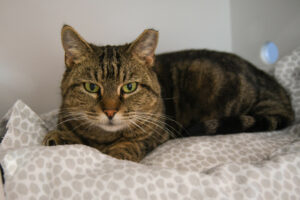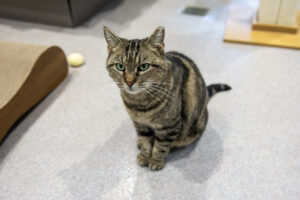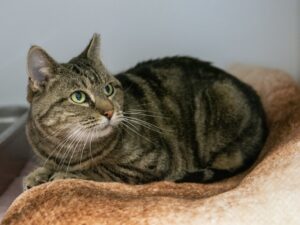 Syl, you take your time.
Syl, you take your time.
You take your deep breaths.
You take each syllable on your tongue until your own poetry prevails.
Sylvia‘s past was not what you would call “poetic,” unless we are speaking of the Magnetic Poetry that comes in frantic rectangles. Those cut-out words are meant to inspire creativity on your refrigerator, but they look like material for a ransom letter. The words fall out of the box like pins and needles, and all the syntax goes silly.
Sylvia’s past was not exactly “silly,” either. A stout little nutmeg cat should be curled on a cushion; this is simply good metaphysics. But even among city strays, Sylvia was low on comedy. Philadelphia’s loveliest tabby was toting around a tome no one knew how to read.
It contained just four letters, over and over for a thousand pages: F-e-L-V.
Many a stray cat finds love’s exclamation point at the end of her streetwise sentence. But feline leukemia virus shreds the page. This most feared feline affliction shouts over the sweetest sonnet. It makes even a brave cat forget that the world should be both poetic and silly.
 Until a poet laureate leaps onto the page.
Until a poet laureate leaps onto the page.
With apologies to T.S. Eliot and Maya Angelou, this world has never known a greater poet than the artist we will call Z. At thirteen years of age, this wise and gentle soul was about to embark on his masterpiece. He was about to meet a speckled stray in need of a new page.
He was about to write history.
Z. loved Sylvia instantly and honestly. She did nothing to earn his devotion; she simply lived, and yearned, and looked in his eyes. Z. looked back and heard love’s lyrics. He pulled out pen and paper. He hurled himself into finding his friend a home.
When you sit down to write, you expect the words to be kind. You make peppermint tea for the paragraphs and offer coffee cake to the adverbs. But sometimes, the letters lose their magnetism. The story folds its arms and hisses. You can’t wait for the muse, who has wandered off to get a cheesesteak.
You must write history. You must have a heart as hardy as Z.’s.
When Sylvia’s diagnosis spilled across the page, Z. did not crumple his papers. Very well, then. He would simply have to work harder, make more phone calls, advocate more earnestly for the friend he refused to fail.
He would have to become silly.
We hear “silly” and we picture lizards in tuxedos, or Cher impersonator conventions, or poems that begin “There once was a cat from Nantucket.” We should picture Z. We should picture Sylvia. We should picture ourselves at our rare and resplendent best.
In ancient Greek, “silly” is the same word as “happy” or “blessed.”
As in, “silly are the peacemakers.”
 “Silly are the pure in heart.”
“Silly are the pure in heart.”
Silly are those who give their all to give a nervous nutmeg cat a new song.
Z. prevailed, as poets always do. Stubborn stanzas finally split wide open. Z. read about Quinn’s Corner. Z. wrote free verse. Z. freed Sylvia from a past that was, in the end, merely prologue.
Sylvia is reading these words from the most peaceful suite in Quinn’s Corner. Her roommates are Puff and Sammy, romance novelists with tender hearts. Her admirers are innumerable, staff and volunteers as wonderstruck as Whitman for one warm little cat.
Syl is still taking it all in. It takes time to take your place among the poets, and it takes a lifetime to listen well enough to hear that you are held, forever.
It takes a Z. to assemble the entire alphabet on behalf of someone small.
It takes the silly to save a life.
Syl, you take your time.
